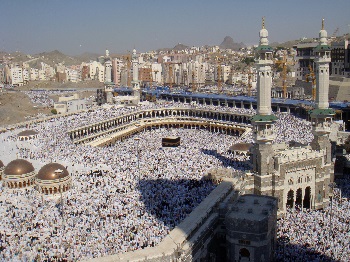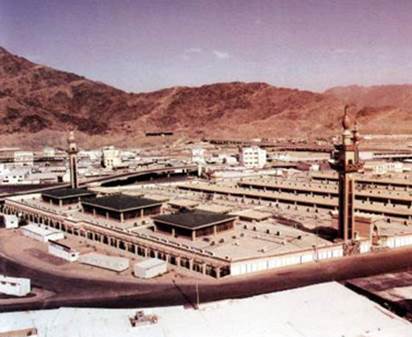The Pilgrimage (Hajj) (part 2 of 3)
Description: An easy to follow guide outlining the essentials every new Muslim must know about Hajj, the greater pilgrimage to Mecca.
By Abdurrahman Murad (© 2013 NewMuslims.com)
Published on 16 Dec 2013 - Last modified on 22 May 2016
Printed: 298 - Emailed: 0 - Viewed: 22,443 (daily average: 5)
Objectives:
·To learn how to perform Hajj.
Arabic Terms
·Yaum ul-Arafah – Day of Arafah when pilgrims gather at a place called Arafah.
·Dhul-Hijjah – the name of the 12th month of the Islamic lunar calendar.
·Du’a - supplication, prayer, asking Allah for something.
·Fajr, Dhuhr, Asr, Maghrib, Isha – the names of five daily prayers in Islam.
·Hajj - A pilgrimage to Mecca where the pilgrim performs a set of rituals. The Hajj is one of the five pillars of Islam, which every adult Muslim must undertake at least once in their life if they can afford it and are physically able.
·Ihram – A state in which one is prohibited to practice certain deeds that are lawful at other times. It is necessary when performing the rites of Umrah and Hajj.
·Kabah – The cube-shaped structure located in the city of Mecca. It serves as a focal point towards which all Muslims face when praying.
·Masjid - the Arabic term for mosque.
·Talbiyah – The proclamation Muslims chant during the pilgrimage.
·Tarwiyah – The 8th day of the month of Dhul-Hijjah, the first actual day of Hajj.
·Umrah – A pilgrimage to the Holy House of Allah in the city of Mecca, Saudi Arabia. Often referred to as the lesser pilgrimage. It can be performed at any time of the year.
Introduction
 Hajj is a pillar of Islam and an act of
worship that combines, belief, statements and actions; in short it is an act of
worship that requires your full attention. It is wise for you to leave
shopping, chasing those extraordinary deals, which you will definitely see, for
after the Hajj season.
Hajj is a pillar of Islam and an act of
worship that combines, belief, statements and actions; in short it is an act of
worship that requires your full attention. It is wise for you to leave
shopping, chasing those extraordinary deals, which you will definitely see, for
after the Hajj season.
One important gadget that you shouldn’t forget is a cell phone. It is advisable that you not use an expensive handset during this period, but simply resort to using a cheaper one that can be purchased at the Pilgrims City (upon your arrival in Saudi). These cell-phones are usually sold with a pre-paid SIM card. Save the number of your group’s director and Hajj leader on the phone.
There are 3 types of Hajj and this series will be explaining the most common type, Hajj Tamattu’. In this you will perform Umrah upon arrival from your country before the 8th of Dhul-Hijjah (the procedure of performing Umrah has been explained earlier).
8th Day of Dhul-Hijjah
We are now on the 8th of Dhul-Hijjah. It is known as the ‘day of Tarwiyah’ or 'the day of fetching water and quenching thirst.' It is called by this name, because the pilgrims would get ready for this long day and night by feeding their animals and making sure their camels had enough water for the long journey ahead. They would also stock up on water in anticipation of the long stand on the day of Arafah, which was usually a hot, long day!
When the day of Tarwiyah comes, one should enter Ihram in the morning from the place where he is in Mecca. The Prophet, may the mercy and blessings of Allah be upon him, donned the garments of Ihram at the Duha time (the time just after sunrise till just before the sun reaches its zenith). He should then say the following: Lab’baika Haj’jan (Here I am O Allah performing the Hajj) which indicates one’s intention of performing the Hajj. After that one should say the Talbiyah continuously: ‘Lab’baik Al’laahum’ma Lab’baik, Lab’baika laa Shareeka laka Lab’baik, In’nal Hamda wan Ni’mata laka wal Mulk, Laa Shareeka lak’.[1]
You would then proceed with your Hajj group to the area of Mina, which literally is a tent city. Millions of people gather here on this day from all corners of the globe. It is wise that you carefully note the area that you are in; each is marked with a color and an identification code. If this fails, then you can simply ask for the general location of the tents of your country.
It is important for one to try their best to be in Mina before the sun reaches its zenith. The pilgrim should busy himself with the remembrance of Allah and recite the Quran. One should avoid idle talk and discussion of worldly matters and argumentation.
Abu Hurairah, may Allah be pleased with him said: “I heard the Prophet say, ‘Whoever performs Hajj and does not commit any rafath (obscenity) or fusooq (transgression), he returns (free from sin) as the day his mother gave birth to him’”. (Saheeh Al-Bukhari)
 While here, the pilgrim should perform each prayer (Dhuhr, Asr,
Maghrib, Isha and Fajr) in its time. They shouldn’t
combine prayers, but each four unit prayer is shortened to two units.
While here, the pilgrim should perform each prayer (Dhuhr, Asr,
Maghrib, Isha and Fajr) in its time. They shouldn’t
combine prayers, but each four unit prayer is shortened to two units.
There is a very interesting masjid in Mina. It is known as Masjid Kheef. The Prophet, may the mercy and blessings of Allah be upon him, said: “Seventy Prophets performed prayer in this masjid.” (Baihaqi)
It is not required of one to visit that masjid or to pray there, some may carry this belief, but there is no basis for it.
Depending on the bus schedule for your Hajj group, you may move from Mina to the next stop in Hajj shortly after the Fajr prayer or before the Dhuhr prayer of the 9th day of Dhul-Hijjah.
The 9th Day of Dhul-Hijjah
The 9th day of Dhul-Hijjah is called Yaum ul-Arafah orthe day of Arafah. It is the most important day of Hajj. The Prophet, may the mercy and blessings of Allah be upon him, said: “Hajj is Arafah” (Ahmed)
The pilgrim should stay at Arafah (a pilgrimage site) till just before sunset. The Prophet said: “The best du'a (supplication) on the day of Arafah; the best thing I have said and the Prophets before me have said is “Laa ilaahah il'la Allah wahdahu laa shareeka lahu, lahul-mulk wa lahul-hamd yuh'yee wa yu'meet wa hu'wa 'alaa kol'lee shay'in qadeer.”[2] (Sahih at-Targhib)
In the next lesson we will learn about the remaining actions of Hajj.
Footnotes:
[1] Meaning: Here I am O Allah in response to Your call, here I am. Here I am, You have no partner, here I am. Verily all praise, grace and sovereignty belong to You. You have no partner
[2] Meaning: None has the right to be worshipped but Allah alone, Who has no partner. His is the dominion and His is the praise. He brings life and He causes death, He is Able to do all things.
Previous Lesson: The Pilgrimage (Hajj) (part 1 of 3)
Next Lesson: The Pilgrimage (Hajj) (part 3 of 3)
- Parenting in Islam (part 1 of 2)
- Parenting in Islam (part 2 of 2)
- Major Sins in Islam (part 1 of 2): What is aMajor Sin?
- Major Sins in Islam (part 2 of 2): Major Sins and How toRepent from Them
- The Pilgrimage (Hajj) (part 1 of 3)
- The Pilgrimage (Hajj) (part 2 of 3)
- The Pilgrimage (Hajj) (part 3 of 3)
- The Rightly Guided Caliphs: Abu Bakr (part 1 of 2)
- The Rightly Guided Caliphs: Abu Bakr (part 2 of 2)
- The Rightly Guided Caliphs: Umar ibn Al-Khattab (part 1 of 2)
- The Rightly Guided Caliphs: Umar ibn Al-Khattab (part 2 of 2)
- The Rightly Guided Caliphs: Uthman ibn Affan (Part 1 of 2)
- The Rightly Guided Caliphs: Uthman ibn Affan (part 2 of 2)
- The Rightly Guided Caliphs: Ali ibn AbiTalib (part 1 of 2)
- The Rightly Guided Caliphs: Ali ibn Abi Talib (part 2 of 2)
- Events on the Day of Judgment (part 1 of 3): The Day Begins
- Events on the Day of Judgment (part 2 of 3):Before the Judgment
- Events on the Day of Judgment (part 3 of 3): Judgment Begins
- Interest in Islam (part 1 of 2)
- Interest in Islam (part 2 of 2)
- An Explanation of Surah Al-Asr
- The Questioning in the Grave (part 1 of 2): Death is not theEnd
- The Questioning in the Grave (part 2 of 2): Your Place untilthe Day of Judgment
- The Fruits of Taqwa (part 1 of 2)
- The Fruits of Taqwa (part 2 of 2)
- An Explanation of Surah Al-Ikhlas
- The Rights of Neighbours in Islam (part 1 of 2): The KindTreatment of Neighbours
- The Rights of Neighbours in Islam (part 2 of 2): Neighbours -Good and Bad
- Those Shaded when there is no Shade (part 1 of 2): Allah’sMercy made Manifest
- Those Shaded when there is no Shade (part 2 of 2): Strivingto be Shaded


